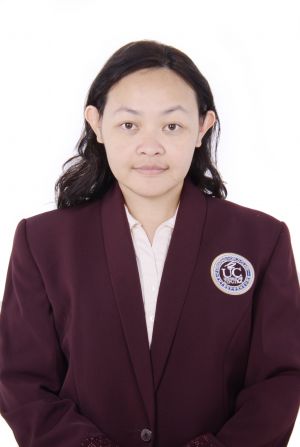Lya Dewi Anggraini
Lya Dewi Anggraini, S.T., M.T., Ph.D.
Lya Dewi Anggraini, S.T., M.T., Ph.D. is a Assistant Professor in Universitas Ciputra. She joined Universitas Ciputra since 2017 at Architecture dept. and currently the head of history and theory of architecture laboratory. Her courses are Research Methods, Sustainable Environment, History and Theory of Architecture, and Compact Space Design (designing studio). Her research focuses more on human behavior system (privacy mechanism and human interpersonal relationship), spatial system, and sustainable environment. Currently, she is conducting research on social-cultural related studies such as Chinatown (Pecinan), shop houses typology, traditional houses, and kampung as heritage buildings. She is also interested micro teaching and distance learning, love singing, music, and reading books or comics. An updated list of research history and her current research network is viewable in <a href="One%20important%20factor%20in%20improving%20the%20quality%20of%20learning%20is%20the%20classroom%20atmosphere,%20which%20is%20formed%20through%20the%20activities%20carried%20out%20in%20it%20between%20the%20teacher%20and%20students%20with%20posi-%20tion,%20posture,%20and%20body%20language,%20as%20non-verbal%20communication,%20and%20the%20use%20of%20words,%20intona-%20tion,%20and%20pronunciation%20as%20verbal%20communication.%20Another%20important%20factor%20is%20the%20characteris-%20tics%20of%20the%20space%20where%20the%20activity%20takes%20place%20(setting).%20In%20applying%20the%20student-centered%20approach,%20which%20motivates%20students%20to%20learn%20more%20actively%20and%20not%20depend%20on%20the%20teacher,%20the%20role%20of%20a%20teacher%20is%20very%20important%20to%20always%20be%20able%20to%20improvise,%20exploit%20the%20potential%20and%20position,%20for%20the%20success%20of%20the%20teaching-learning%20process%20in%20schools.%20The%20purpose%20of%20activi-%20ties%20in%20the%20field%20of%20interior%20science%20architecture%20community%20service%20at%20SMAK%20St.%20This%20framework%20is%20to%20strengthen%20the%20participation%20of%20teachers%20and%20students%20through%20the%20setting%20of%20learning%20spaces%20that%20support%20the%20establishment%20of%20communication%20as%20desired.%20The%20method%20used%20is%20observation%20of%20the%20physical%20environment%20and%20surveys%20of%20teachers%20and%20students%20about%20the%20communication%20experience%20and%20the%20convenience%20of%20learning%20on%20three%20subjects%20that%20are%20con-%20sidered%20difficult,%20namely%20Chemistry,%20Biology,%20and%20English.%20The%20survey%20results%20show%20that%20effec-%20tive%20verbal%20and%20non-verbal%20communication%20media%20between%20teachers%20and%20students%20and%20fellow%20students%20is%20triggered%20by%20the%20setting%20of%20the%20space%20outside%20the%20classroom,%20with%20more%20relaxed%20and%20enjoyable%20reasons,%20such%20as%20in%20a%20library%20room.%20This%20has%20a%20real%20impact%20on%20increasing%20student%20motivation%20in%20the%20form%20of%20subjects’%20likes%20and%20grades.%20Other%20results%20indicate%20an%20increase%20in%20teacher%20awareness%20that%20changes%20in%20varied%20learning%20space%20settings%20can%20support%20non-verbal%20communication%20with%20students." target="_blank" rel="noopener">researchgate</a>.
Author Pages
| ORCiD | https://orcid.org/0000-0002-4565-2198 |
| Google Scholar | https://scholar.google.co.id/citations?user=07BHLN0AAAAJ |
| SINTA | https://sinta.ristekbrin.go.id/authors/detail?id=6004414&view=overview |
Expertise
- History & theory of architecture
- Human behaviour approach
- Spatial system
- Privacy mechanism
- Sustainable environment
International Journal
- Spatial Connectivity of Indonesian Shop Houses. Asian Journal of Environment-Behaviour Studies (2018)
- The Degree of Privacy Requirement for Residents' Activities in the Shophouse in Yogyakarta. Journal of Habitat Engineering and Design (2013)
National Journal
- Perancangan Butik. Aksen (2021)
- Model Bisnis Berbasis 'Kontrak Jiwa' pada Industri Rumah Alam Batik Pasuruan. Jurnal Abadimas Adi Buana (2020)
- Pembelajaran Biologi Sel dengan Peraga Sederhana. Jurnal Pengabdian Barelang (2020)
- Peningkatan Pembelajaran Student-Centered SMAK Santo Yusup Surabaya melalui Penataan Ruang Kelas. Jurnal Pengabdian Masyarakat Universitas Merdeka Malang (2020)
- HUBUNGAN INTERPERSONAL DALAM KONTEKS SOSIAL MASYARAKAT URBAN YOGYAKARTA: KAJIAN PRIVASI AKUSTIK, VISUAL DAN FISIK. AKSEN, Journal of Design & Creative Industry (2019)
International Proceeding
- Rebranding Chinatown Surabaya. Proceeding Book of The International Conference on Chinese Indonesian Cultural Heritage (2021)
- The Four Attributes of Kampung as Living Heritage. International Conference on Indonesia Culture (2020)
- Spatial Arrangement in Chinese and Javanese Shop House in Yogyakarta City. ASEAN Conference on Environment-Behaviour Studies (2012)
- A Strategy of Two Different Cultures for Dealing with Housing Issues of Shop Houses in Yogyakarta City. International Network Symposium (2011)
National Proceeding
- Desain Kursi Kepiting Media Pembelajaran bagi Anak Diskalkulia. Prosiding Seminar Nasional Desain Sosial 2021 (2021)
- Kursi Ergonomis Berbahan Cooper Infused Textile Mengurangi Penyebaran Virus di Ruang Publik. Prosiding Seminar Nasional Desain Sosial 2021 (2021)
- Membangun Kembali Citra Pecinan di Kyakya Surabaya. Prosiding Seminar Nasional Desain Sosial 2021 (2021)
- Metode Pembelajaran Online untuk Meningkatkan Interaksi Mahasiswa. Prosiding Seminar Nasional Desain Sosial 2021 (2021)
- Penerapan Internet of Things dalam Pembelajaran Daring di Masa Depan untuk Membantu Guru SMA Kalam Kudus. Prosiding Seminar Nasional Desain Sosial 2021 (2021)
- Penerapan Pemilu Online Berbasis Aplikasi Smartphone di Era Pandemi Covid-19. Prosiding Seminar Nasional Desain Sosial 2021 (2021)
- Perubahan Perilaku Pengunjung Pasca Pandemi Covid-19 Terhadap Desain Interior Cafe. Prosiding Seminar Nasional Desain Sosial 2021 (2021)
- Minat Generasi Muda terhadap Co-Working Space di Kota Blitar. Prosiding Envisi 2020 Arsitektur Interior (2020)
- Penerapan Blended Learning dalam Kelas Sejarah dan Teori Arsitektur Interior Universitas Ciputra. Seminar Nasional ENVISI 2020 Arsitektur Interior (2020)
- Manfaat Perubahan Politik Terhadap Identitas Budaya Pecinan Kekinian. Prosiding Seminar Nasional Politik dan Kebudayaan (2016)
Book
- Modul Pembelajaran Daring SMA & Perguruan Tinggi (2021)
- MODUL PEMBUATAN VIDEO KREATIF Premiere Pro, Canva, dan Powtoon (2021)
- Modul Teknologi Pembelajaran Kahoot (2019)
- Modul Training Helmin (Cacing) untuk Guru SMA (2019)
- Tipologi Fasad Rumah Toko Cina di Ketandan Yogyakarta (2008)
Copyright
- Desain Arsitektur Lingkungan Terintegrasi dengan Pendalaman Ventilasi Alami (2021)
- Desain Arsitektur Lingkungan Terintegrasi dengan Penerapan Stack Ventilation pada Rancangan Rumah Tinggal (2021)
- Desain Arsitektur Lingkungan Terintegrasi, dengan Pendekatan Ventilasi Alami (2021)
- ANIMASI DESAIN RUANG SOSIAL KAMPUNG LAWAS MASPATI SURABAYA (2020)
- LANSEKAP KAMPUNG LAWANG SEKETENG (2020)
- LANSEKAP KAMPUNG MASPATI (2020)
Industrial Design
- Set Mebel Dapur (2021)
- Gapura (2020)
Formal Educations
| Year | Level | School/Institution/University |
|---|---|---|
| 1995 - 2000 | S1 | Universitas Gadjah Mada |
| 2002 - 2007 | S2 | Universitas Gadjah Mada |
| 2010 - 2013 | S3 | Tokyo Institute Of Technology |
